
The History of Sexuality is a four-volume study of sexuality in the Western world by the French historian and philosopher Michel Foucault, in which the author examines the emergence of "sexuality" as a discursive object and separate sphere of life and argues that the notion that every individual has a sexuality is a relatively recent development in Western societies. The first volume, The Will to Knowledge, was first published in 1976; an English translation appeared in 1978. The Use of Pleasure, and The Care of the Self, were published in 1984. The fourth volume, Confessions of the Flesh, was published posthumously in 2018.

Greek Homosexuality is a book about homosexuality in ancient Greece by the classical scholar Kenneth Dover, in which the author uses archaic and classical archaeological and literary sources to discuss ancient Greek sexual behavior and attitudes. He addresses the iconography of vase paintings, the speeches in the law courts, and the comedies of Aristophanes, as well as the content of other literary and philosophical source texts.
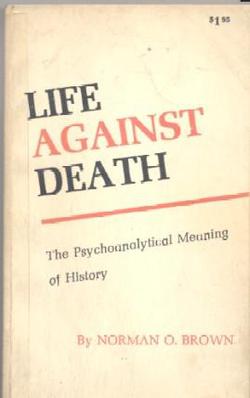
Life Against Death: The Psychoanalytical Meaning of History is a book by the American classicist Norman O. Brown, in which the author offers a radical analysis and critique of the work of Sigmund Freud, tries to provide a theoretical rationale for a nonrepressive civilization, explores parallels between psychoanalysis and Martin Luther's theology, and draws on revolutionary themes in western religious thought, especially the body mysticism of Jakob Böhme and William Blake. It was the result of an interest in psychoanalysis that began when the philosopher Herbert Marcuse suggested to Brown that he should read Freud.

Eros and Civilization: A Philosophical Inquiry into Freud is a book by the German philosopher and social critic Herbert Marcuse, in which the author proposes a non-repressive society, attempts a synthesis of the theories of Karl Marx and Sigmund Freud, and explores the potential of collective memory to be a source of disobedience and revolt and point the way to an alternative future. Its title alludes to Freud's Civilization and Its Discontents (1930). The 1966 edition has an added "political preface".

Gay Science: The Ethics of Sexual Orientation Research is a 1997 book by the philosopher Timothy F. Murphy about scientific research on sexual orientation.

David M. Halperin is an American theorist in the fields of gender studies, queer theory, critical theory, material culture and visual culture. He is the cofounder of GLQ: A Journal of Lesbian and Gay Studies, and author of several books including Before Pastoral (1983) and One Hundred Years of Homosexuality (1990).

Virtually Normal: An Argument About Homosexuality is a book about the politics of homosexuality by the political commentator Andrew Sullivan, in which the author criticizes four different perspectives on gay rights in American society, which he calls the "Prohibitionist", "Liberationist", "Conservative", and "Liberal" views, seeking to expose internal inconsistencies within each of them. He also criticizes the philosopher Michel Foucault and gay rights activists he considers influenced by Foucault, and argues in favor of same-sex marriage and an end to the don't ask, don't tell policy, which banned service by openly gay people in the US military. However, he makes a case against legislation aimed at preventing private discrimination against gay people.

The Assault on Truth: Freud's Suppression of the Seduction Theory is a book by the former psychoanalyst Jeffrey Moussaieff Masson, in which the author argues that Sigmund Freud, the founder of psychoanalysis, deliberately suppressed his early hypothesis, known as the seduction theory, that hysteria is caused by sexual abuse during infancy, because he refused to believe that children are the victims of sexual violence and abuse within their own families. Masson reached this conclusion while he had access to several of Freud's unpublished letters as projects director of the Sigmund Freud Archives. The Assault on Truth was first published in 1984 by Farrar, Straus and Giroux; several revised editions have since been published.

A Separate Creation: The Search for the Biological Origins of Sexual Orientation, also published with the subtitle How Biology Makes Us Gay, is a 1996 book about the development of sexual orientation by the journalist Chandler Burr. It received mainly positive reviews, commending it as a useful discussion of scientific research on sexual orientation and the politics surrounding the issue.

Homosexuality: A Philosophical Inquiry is a 1988 book by the philosopher Michael Ruse, in which the author discusses different theories of homosexuality, evaluates the moral status of homosexual behavior, and argues in favor of gay rights.
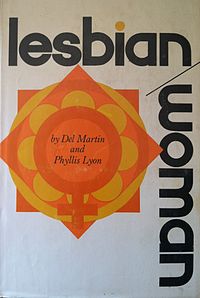
Lesbian/Woman is a work by the feminist and gay rights activists Del Martin and Phyllis Lyon, in which the authors discuss what it means to be a lesbian. The book was influential and is considered a foundational text of lesbian feminism. Reviewers believed that it benefited from its authors' personal experience as lesbians, and endorsed its criticisms of the treatment of lesbians by religious and professional organizations.

The Homosexual Matrix is a book by American psychologist Clarence Arthur Tripp, in which the author discusses the biological and sociological implications of homosexuality, and also attempts to explain heterosexuality and bisexuality. The book was first published in 1975 by McGraw-Hill Book Company; it was republished in a revised edition in 1987. Based on his review of the evidence, Tripp argues that people do not become homosexual due to factors such as hormone levels, fear of the opposite sex, or the influence of dominant and close-binding mothers, and that the amount of attention fathers give to their sons has no effect on the development of homosexuality. He criticizes Sigmund Freud and argues that psychoanalytic theories of the development of homosexuality are untenable and based on false assumptions. He maintains that sexual orientation is not innate and depends on learning, that early puberty and early masturbation are important factors in the development of male homosexuality, and that a majority of adults are heterosexual because their socialization has made them want to be heterosexual. He criticizes psychotherapeutic attempts to convert homosexuals to heterosexuality and argues in favor of social tolerance of homosexuality and non-conformist behavior in general.
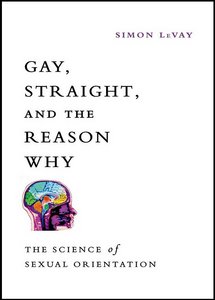
Gay, Straight, and the Reason Why: The Science of Sexual Orientation is a book by the neuroscientist Simon LeVay and published by Oxford University Press. The book received mainly positive reviews, praising it for LeVay's wide-ranging overview of scientific research on sexual orientation. In 2012, it received the Bullough Book Award for the most distinguished book written for the professional sexological community published in a given year.
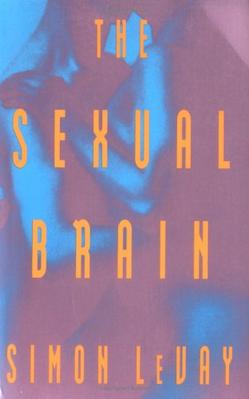
The Sexual Brain is a 1993 book about brain mechanisms involved in sexual behavior and feelings, and related topics such as sexual orientation, by the neuroscientist Simon LeVay. The book was praised as a well-written work on science. However, some reviewers pointed out factual errors, and stated that LeVay failed to prove that homosexuality has a biological basis.

Sexuality and Its Discontents: Meanings, Myths, and Modern Sexualities is a 1985 book about the politics and philosophy of sex by the sociologist Jeffrey Weeks. The book received positive reviews, crediting Weeks with explaining the theories of sexologists and usefully discussing controversial sexual issues. However, Weeks was criticised for his treatment of feminism and sado-masochism.

Sex and Reason is a 1992 book about human sexuality by the economist and federal judge Richard Posner, in which the author attempts to explain sexual behavior in economic terms and discusses a range of controversial subjects related to sex, proposing reforms in American laws.

What Wild Ecstasy: The Rise and Fall of the Sexual Revolution is a 1997 book about the sexual revolution by John Heidenry. The book received mixed reviews. It was described as interesting and Heidenry was complimented for his discussions of figures such as Bob Guccione, Hugh Hefner, Larry Flynt, and Reuben Sturman. However, he was criticized for his research methods. He was accused of plagiarism because of the use he made of material by other writers, receiving criticism in particular from the journalist Philip Nobile. Critics also wrote that he focused disproportionately on pornography and gave insufficient attention to feminism and women's issues.

The Science of Desire: The Search for the Gay Gene and the Biology of Behavior is a 1994 book by the geneticist Dean Hamer and the journalist Peter Copeland, in which the authors discuss Hamer's research into the genetics of homosexuality.

The Homosexualization of America, The Americanization of the Homosexual is a 1982 book about LGBT rights in the United States by the gay rights activist Dennis Altman, in which the author discusses the emergence of gay people as a minority group. The book received positive reviews, crediting Altman with providing a useful discussion of gay people in the United States.
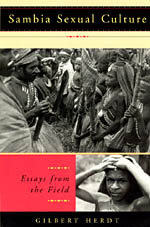
Sambia Sexual Culture: Essays from the Field is a 1999 book about the Simbari people and their sexual practices by the anthropologist Gilbert Herdt. The book received negative reviews, accusing Herdt of being biased in his approach and his conclusions. In the book the Simbari people are called Sambia people




















